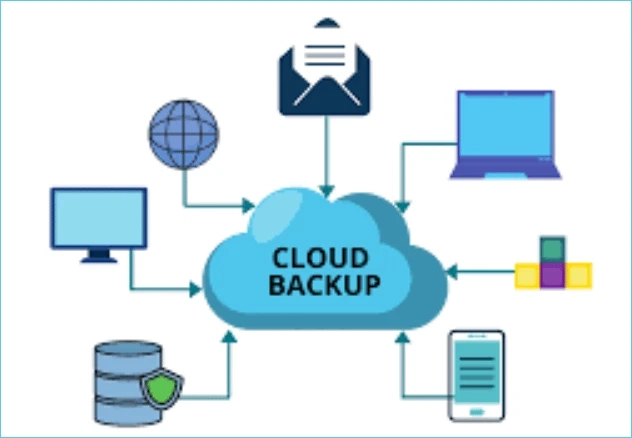Everything You Need to Know About Cloud Backup Services
Are you looking for an efficient and reliable way to store your data? Cloud backup services can provide a secure solution for backing up your essential files. These services allow users to create backups of their important documents, images, applications, and other types of digital content quickly and conveniently. With the help of cloud storage, businesses can also keep their valuable assets safe from hackers or accidental losses. Read on to learn more about how cloud backup services work and why they are becoming increasingly popular today!
What are Cloud Backup Services?
Cloud backup services provide secure off-site storage for data and files. They can be used to back up important business information, personal files, or anything else that needs to be preserved. Cloud backup services store data in the cloud and provide users with access to the backed up versions of their documents whenever needed. They offer an automated way of backing up files, making it easy and convenient. Some cloud backup services also offer additional features such as encryption, versioning, and disaster recovery. With these features, users are able to ensure their data is kept safe while they have access to backup versions of their work.
Also, Read: What are Different Cloud Backup Solutions?
Types of Cloud Backup Service
1. Local Cloud Storage:
Local cloud storage is typically used for business operations and offers secure data storage on premise.
2. Hybrid Cloud Storage:
Hybrid cloud storage provides a combination of local, private and public cloud services in a single solution.
3. Public Cloud Storage:
Public cloud storage enables users to store their data in an off-site, secure environment.
4. Private Cloud Storage:
Private clouds offer dedicated off-site resources specifically designed to meet the needs of the user or organization.
5. Backup as a Service (BaaS):
Backup as a service (BaaS) offers on-demand back up services that are tailored to the exact specifications of the customer.
Advantages of Cloud Backup Services
1. Cost-Effective:
Cloud backup services are typically much more cost-effective than traditional data storage methods, such as external hard drives or tape backups.
2. Reliability & Availability:
Cloud backup services provide an automated and secure way for users to store important files and data offsite and make them available anytime.
3. Flexibility & Scalability:
With cloud backup services, users can scale their service up or down depending on their needs. It also allows them to access their backed up data from any device with an internet connection, providing great flexibility and convenience.
4. Security:
A good cloud backup service should include encryption technology to ensure that data is kept safe while in transit or stored in the cloud. Additionally, many providers offer advanced security features like multi-factor authentication to further protect your data.
5. Data Protection & Recovery:
Most cloud storage providers offer comprehensive data protection solutions, including automated backups and disaster recovery options in case of a system failure or attack by malicious actors.
6. Automation:
Many cloud backup services come with automation features that allow users to monitor systems and schedule backups without needing manual intervention from IT staff or other personnel.
7. Data Accessibility:
Cloud backup services make it easy for users to access their files from any device with an internet connection, no matter where they are located geographically.
8. Comprehensive Solution:
By using a single provider for both public and private cloud storage needs, organizations can combine all of their resources into one secure solution for easy management and scalability over time.
Tips for Setting Up Your Cloud Backup Service:
1. Research Vendors:
Make sure to do your research into different vendors and select one that best meets your needs.
2. Assess Data Storage Requirements:
Assess both the data you will be storing and the volume of data in order to determine the right service size and capacity for your organization.
3. Consider Security Measures:
Choose a provider that offers robust security measures, such as encryption technology, two-factor authentication, or regular vulnerability scans.
4. Automate Processes:
Automate tasks like scheduling backups and monitoring systems wherever possible to ensure data is always protected and up-to-date.
5. Establish Policies & Protocols:
Establish policies for who has access to cloud backups, as well as protocols for when backing up should take place, how often backups should occur, etc.
6. Test System Performance:
Test the system’s performance before finalizing your setup to make sure it meets your expectations in terms of speed, reliability and other features offered by the provider/solution you have chosen.
7. Monitor Usage Regularly:
Make sure to monitor usage regularly to ensure everything is working correctly and no unauthorized access has occurred since setting up the service.
8. Set Access Controls & Permissions:
Set clear access controls for user accounts so that only authorized personnel can view or modify backed up data associated with their accounts"
Conclusion
We hope this guide has helped you understand the key features and benefits of cloud backup services, as well as what to consider when setting up your own cloud storage solution. By selecting a reliable provider and taking advantage of automated processes and security measures, you can ensure that all your important data is backed up safely, securely, and conveniently. Thank you for reading!
FAQs
1. What is cloud backup?
Cloud backup is a service that stores data on remote servers, allowing users to access their files from any device with an internet connection.
2. What are the benefits of using cloud backups?
The main benefits of using cloud backups are convenience, scalability, security, data protection and recovery, automation, and accessibility.
3. How secure are cloud backups?
Cloud backups are generally very secure, especially if you choose a provider that offers advanced security features such as encryption, two-factor authentication, and regular vulnerability scans.
4. What should I look for when setting up my cloud backup service?
When setting up your cloud backup service, it’s important to research vendors, assess your data storage requirements, consider security measures, automate processes where possible, establish policies and protocols, test system performance, monitor usage regularly, and set access controls and permissions.
5. How often should I back up my data?
The frequency of your backups will depend on the type of data you are storing and the volume of data. Generally, it’s recommended to back up your data at least once a day. You can also set up automated backups to ensure that your data is always backed up on a regular basis.
0



